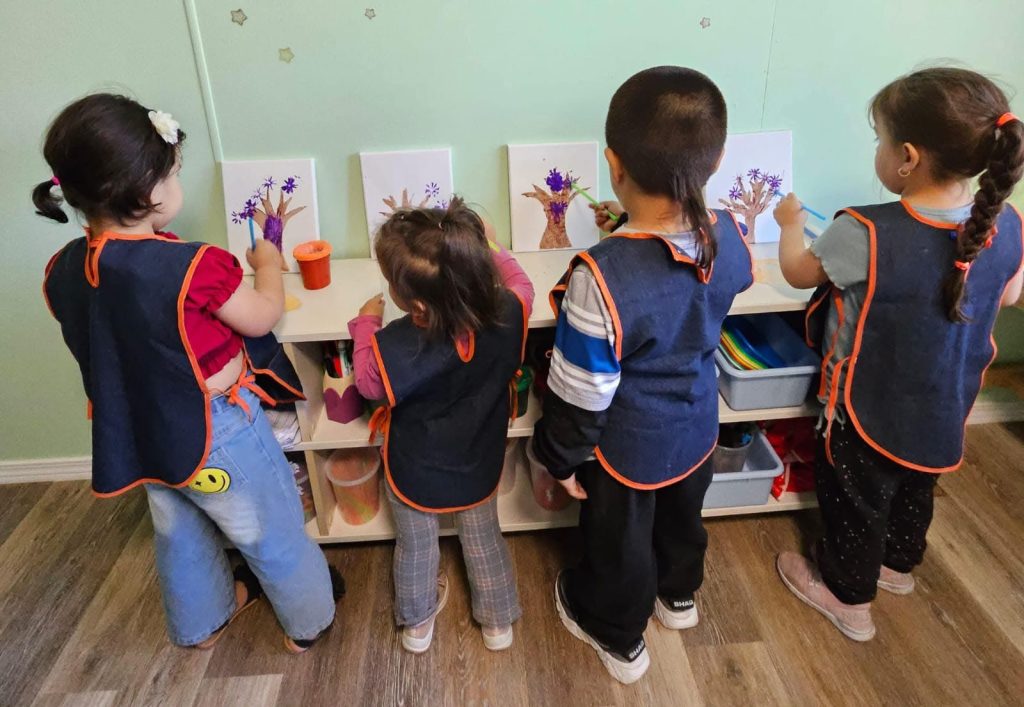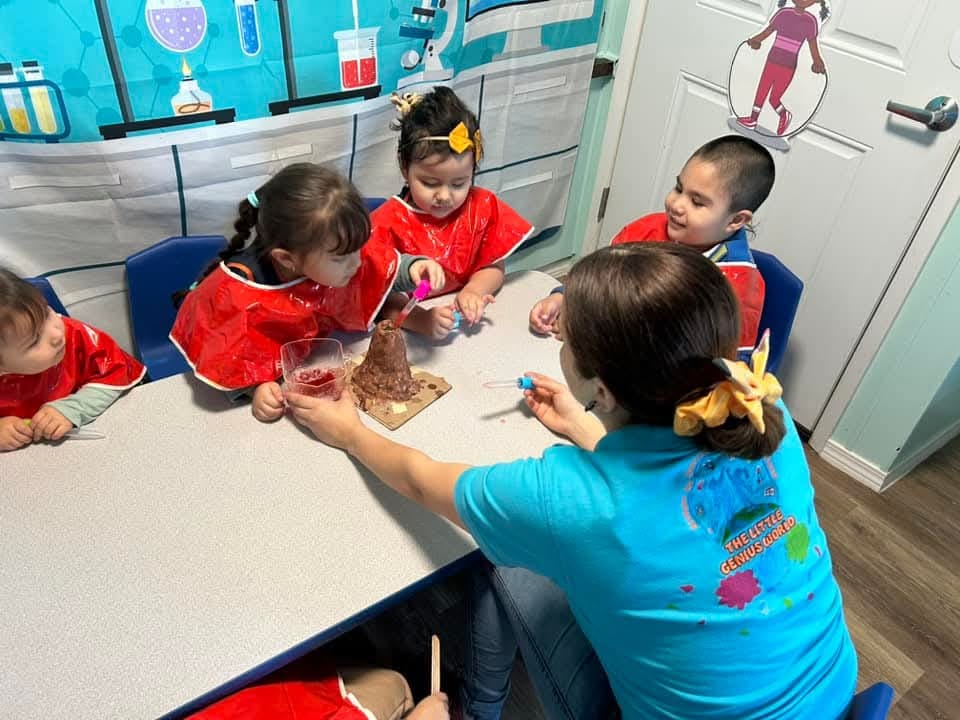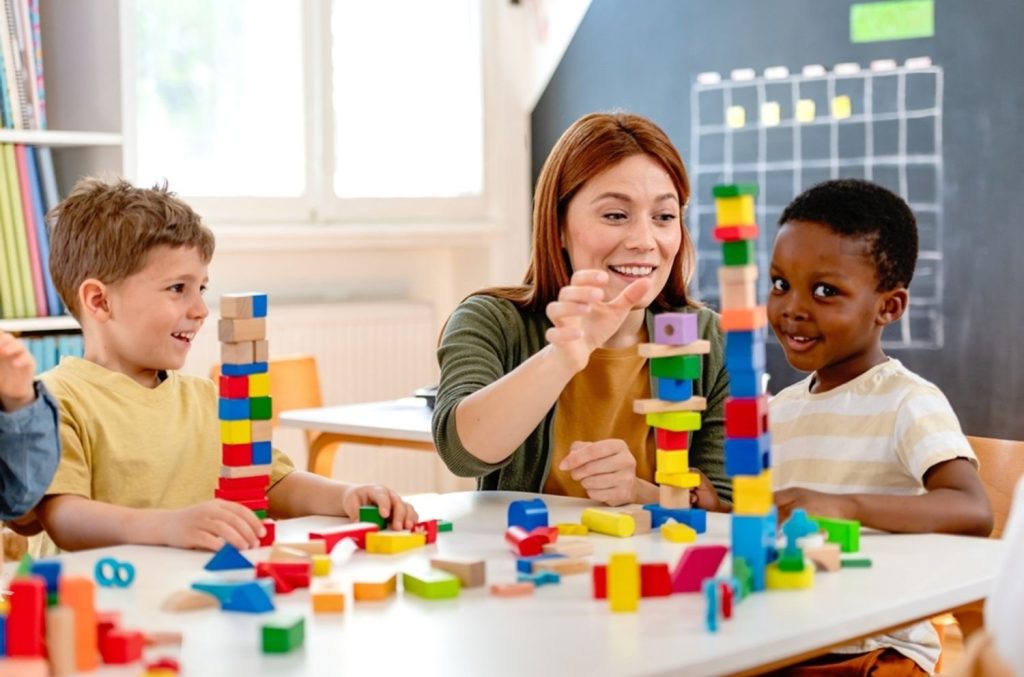A Quick Guide for Families
From the first coo of a baby to the first book read aloud in school, the early years shape a child’s future in powerful ways. Experts agree that the window from birth through age eight is one of the most important times in life. During these years, children grow rapidly in body, mind, and emotions. They absorb information like sponges, and every interaction lays down the foundation for school and lifelong success.
This guide will help you understand early childhood education (ECE), why it matters, the stages of early childhood development, and the benefits of high-quality programs. You’ll also find tips for choosing the right preschool program or early learning center for your family and learn how The Little Genius World (TLGW) brings these ideas to life.
What Is Early Childhood Education?
Early childhood education (ECE) is the combination of care, structured learning, and overall development for children from birth to age eight. It focuses on four interconnected domains: physical growth, cognitive learning, social-emotional development, and language skills. Together, these areas support curiosity, independence, and confidence as children progress through the early years. For example, simple activities like stacking blocks or singing songs help strengthen motor skills, problem-solving, and communication.
High-quality early learning programs and a nurturing preschool program provide the structure and experiences children need to thrive. Strong ECE is also closely tied to early childhood development milestones, laying the groundwork for school readiness. Research shows that children who experience quality ECE are more likely to enter kindergarten prepared, with strong vocabulary, better self-regulation, and the resilience and empathy that support lifelong learning and success.
Why ECE Matters
High-quality early childhood education (ECE) has powerful, research-backed benefits for young children. During these formative years, children’s brains develop rapidly, making them more receptive to learning and social experiences. Strong early learning opportunities nurture language, problem-solving, and self-regulation, giving children the tools they need to thrive in school and beyond.
Evidence-Based Gains
Children in quality programs often show:
- Language growth – richer vocabulary, better storytelling, and stronger communication.
- Self-regulation skills – managing emotions, following directions, and adapting to routines.
- Problem-solving abilities – tackling challenges with creativity and persistence.
Long-Term Benefits
The advantages extend into later years:
- Kindergarten readiness – smoother transitions and early academic confidence.
- Higher graduation odds – linked to early gains in literacy, math, and social skills.
- Equity boost – when access to quality programs is prioritized, children from all backgrounds benefit equally.
These outcomes highlight one clear truth: the quality of early childhood development programs matters just as much as access.
Stages of Early Childhood (0–8)
Infancy (0–12 months)
Infants grow quickly during the first year, forming bonds and learning trust through consistent care. Responsive interactions—like smiling back at a baby’s grin or gently talking during feeding—are critical for early brain development. Babies explore the world through their senses, so safe sensory play with rattles, soft textures, and songs encourages learning. Language begins here, too; cooing, babbling, and singing lay the groundwork for speech. Establishing simple routines—like feeding and bedtime—builds security and helps infants understand patterns.
Toddler Years (1–3)
Toddlers are explorers full of energy. They master walking, climbing, and dancing, and these big motor gains give them confidence to try new things. Language grows rapidly: “mama” and “ball” soon expand into phrases like “want more juice.” Social play evolves as toddlers move from playing alongside others to engaging in simple group activities. Self-help skills begin too—washing hands, feeding themselves, or putting away toys. Consistent routines and gentle guidance support independence while keeping them safe.
Preschool Years (3–5)
The preschool years are a time of rapid growth, where children learn best through play-based experiences. In these years, early literacy skills emerge as children sing songs, recognize letters, and enjoy story time, while early numeracy develops through counting, sorting, and simple problem-solving games. Social skills take shape as preschoolers practice sharing, taking turns, and working with peers. Teachers also help children with emotion labeling, guiding them to recognize and express feelings in healthy ways.
Fine-motor development is supported through activities like drawing, cutting, and building with blocks. A well-designed preschool program structures the day with a balance of group activities, individual exploration, outdoor play, and rest, creating an environment where learning feels joyful and purposeful.
Early Primary (5–8)
By the early primary years, children transition from an early learning center into formal school. Reading moves from sounding out letters to comprehending stories. Number sense develops through addition, subtraction, and problem-solving. Project-based learning encourages teamwork, independence, and critical thinking. At this stage, children become more aware of friendships and group dynamics. Teachers support both academic growth and emotional resilience, helping children gain confidence as learners and community members.
Core Benefits of High-Quality ECE
High-quality early childhood education offers lasting advantages, shaping children’s growth across cognitive, social, physical, and creative domains.
Cognitive & Language Growth
High-quality early childhood education nurtures children’s minds by building strong foundations in thinking and communication. Vocabulary expands as children engage in conversations, listen to stories, and sing songs. Storytelling activities encourage creativity while improving memory and comprehension. Early math and science skills grow naturally during play and daily routines—counting blocks, measuring ingredients, or exploring how plants grow. These early experiences in language, numeracy, and problem-solving are key parts of early childhood development, preparing children for success in kindergarten and beyond.
Social-Emotional Skills
In early childhood education, children learn valuable social-emotional skills that shape how they relate to others. Daily activities encourage sharing toys, taking turns during games, and cooperating in small groups. Teachers guide children in practicing empathy by recognizing how others feel and responding with kindness. When disagreements arise, children are supported in using words for conflict resolution rather than frustration. These moments also strengthen self-regulation, helping children manage emotions, follow routines, and adapt to changes. Together, these experiences build confidence and lay the foundation for positive relationships throughout life.
Physical Development
A strong early childhood education program supports healthy bodies as well as growing minds. Children develop gross motor skills through running, climbing, and outdoor play, while activities like drawing, puzzles, and building strengthen fine motor control. Daily routines that include nutritious meals, active movement, and adequate rest help children build healthy habits early. By combining play, exercise, and balance, early childhood development nurtures both physical strength and overall well-being.
Executive Function & Creativity
In early childhood education, children practice important executive function skills such as attention, memory, and planning. These abilities show up when a child remembers multi-step directions, stays focused on a puzzle, or organizes blocks into a tower. Creativity grows alongside these skills through open-ended play, where imagination guides learning. Art projects, music, and pretend play spark curiosity and problem-solving. By combining structure with creative freedom, early childhood development helps children build flexible thinking and a lifelong love of discovery.
What Quality Looks Like in a Program
When choosing an early childhood education program, here are the signs of quality parents should look for:
- Low teacher-to-child ratios so every child gets personal attention and guidance.
- Trained teachers with knowledge of early childhood development who nurture curiosity, independence, and social skills.
- Safe, inviting classrooms filled with age-appropriate books, toys, and hands-on learning materials.
- Balanced daily schedule that includes:
- Play-based learning activities
- Small-group work for focused instruction
- Outdoor play for exercise and exploration
- Rest periods to recharge and reset
- Warm teacher-child interactions where children feel seen, valued, and encouraged.
- Family partnership through regular updates, progress reports, and open communication.
- An inclusive environment that welcomes diversity, offers Spanish immersive support, and respects cultural backgrounds.
- Joyful learning atmosphere where children feel safe, confident, and excited to come back each day.
Checklist of Quality Indicators:
- Curriculum with clear scope & sequence
- Consistent family communication
- Strong health & safety practices
- Culturally responsive & multilingual supports
- Ongoing observation and assessment
How to Choose the Right Program
Finding the right early learning center or preschool program can feel overwhelming, but asking the right questions and knowing what to watch for makes the process easier.
Questions to Ask on a Tour
- What qualifications and training do teachers have?
- What are the teacher-to-child ratios in each classroom?
- How is the daily schedule balanced between play, learning, outdoor time, and rest?
- What approach is used for behavior guidance?
- How do families receive updates (app, photos, messages)?
- How are meals provided and allergies handled?
Red Flags to Watch
- High staff turnover, leading to inconsistent care
- Overcrowded classrooms with little personal attention
- Limited outdoor or active play opportunities
- Heavy use of worksheets instead of play-based learning
- Little or no communication with families about progress
Visit Checklist
During your visit, take time to observe. Watch how teachers interact with children—are they warm, patient, and engaged? Notice if classrooms are clean, safe, and organized. Most importantly, look for joyful play, laughter, and curiosity, which are hallmarks of a nurturing early childhood education environment.
The Little Genius World Approach
At The Little Genius World (TLGW), learning is rooted in play, curiosity, and connection. Our play-based, Spanish immersion philosophy helps children explore language, build confidence, and develop critical skills for the future. Every classroom supports early childhood education by focusing on social-emotional growth, independence, and kindergarten readiness. With safe teacher-to-child ratios and caring, well-trained staff, children feel secure and supported as they learn and grow.
Families are a vital part of the experience. At TLGW, we keep parents connected and children thriving through a warm, supportive environment that blends care and education.
What Families Can Expect at TLGW:
- Brightwheel app with daily photos, updates, and teacher messages
- Nutritious snacks and lunches following USDA guidelines
- Safe ratios and trained, compassionate teachers
- Welcoming classrooms filled with hands-on learning and joyful play
- Convenient locations in Bellevue and Tukwila, with Federal Way
FAQs
- What does early childhood education mean?
A. Early childhood education refers to the care, learning, and developmental support children receive from birth through age eight. It focuses on physical, cognitive, social-emotional, and language growth, all of which prepare children for school and lifelong learning. - What are the main stages in early childhood (0–8)?
A. The stages include infancy (0–12 months), toddler years (1–3), preschool years (3–5), and early primary (5–8). Each stage builds unique skills in motor development, language, social interaction, and independence. - What’s the primary purpose of ECE?
A. The goal of early childhood education is to nurture a child’s growth and prepare them for kindergarten and beyond. By supporting curiosity, confidence, and resilience, ECE sets the stage for lifelong success. - Is preschool necessary for kindergarten readiness?
A. While not mandatory, a quality preschool program makes a big difference in preparing children for kindergarten. Preschool introduces routines, builds early literacy and math, and strengthens social-emotional skills, making the transition much smoother. - How is an early learning center different from daycare?
A. An early learning center emphasizes education and structured development in addition to care. Unlike traditional daycare, it includes curriculum-based activities, trained teachers, and environments designed to support early childhood development.
Ready to Visit?
We’d love to welcome your family to The Little Genius World! Spots in our programs fill quickly, so now is the perfect time to schedule a tour and see our classrooms in action.
Visit our Locations in Bellevue, Tukwila or Federal Way, or head to our Enrollment page to reserve your child’s place today.


